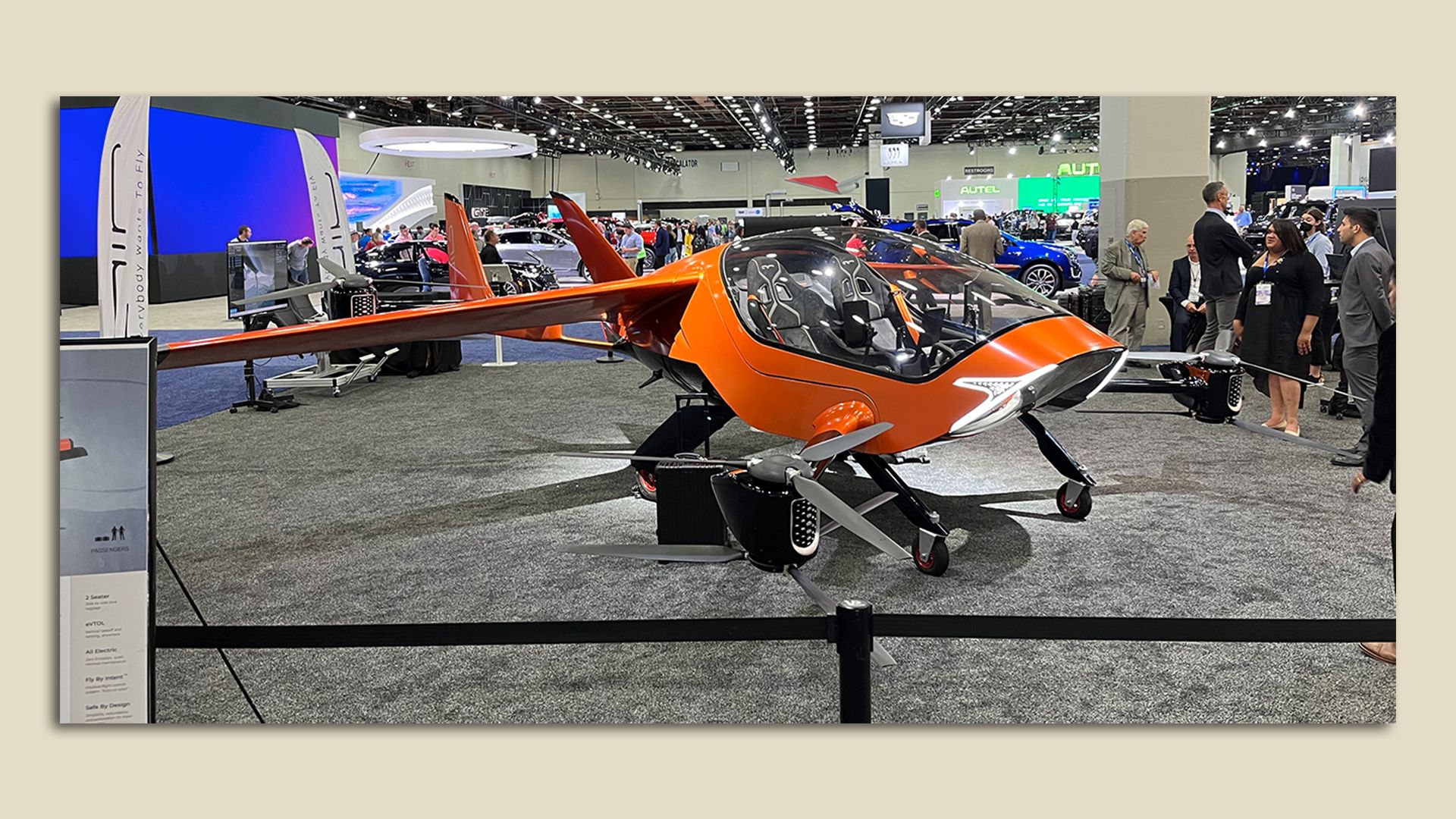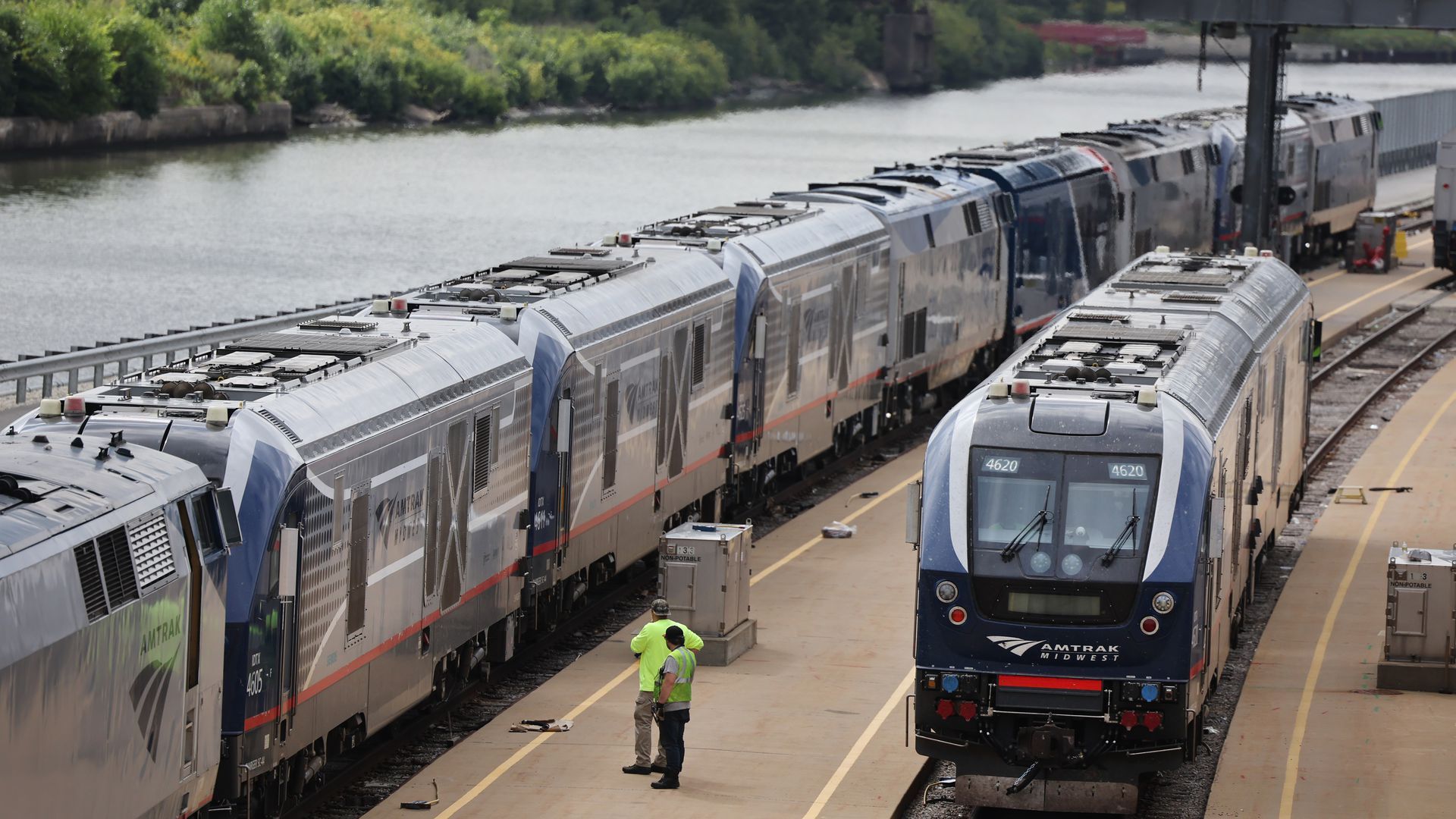| | | | | | | | | | | Axios What's Next | | By Joann Muller, Jennifer A. Kingson and Alex Fitzpatrick · Sep 15, 2022 | | Joann's at the Detroit auto show this week, where she's checking out the latest and greatest in electric cars, "flying taxis" and more — not to mention she scored some time with the transportation secretary. - Axios and Noticias Telemundo invite you to join us virtually for the inaugural Axios Latino Visionarios event on Sept. 29. Register here to livestream sessions.
Today's newsletter is 998 words ... 4 minutes. | | | | | | 1 big thing: The future of mobility is electric — and maybe airborne |  | | | An electric aircraft on display at the Detroit auto show. Photo: Joann Muller | | | | A new era of electric air mobility is on display at this year's North American International Auto Show in Detroit, where flying vehicles nearly outnumber the terrestrial models making their public debut, Joann Muller reports. - Some examples: A virtual reality simulator that lets visitors soar above the city in a two-seat "sports car in the sky," and also in a Star Wars-inspired hoverbike.
- Meanwhile, traditional carmakers are using huge chunks of their display space for ride-and-drive experiences to showcase their electric vehicles' performance.
Why it matters: The future of transportation is electric, autonomous and — potentially — airborne. - Even though Detroit's first post-pandemic auto show is modest by historical standards, the futuristic aircraft and EV test tracks provide some fresh sizzle to inspire the public's imagination about personal mobility in the coming decade.
Driving the news: President Biden and Transportation Secretary Pete Buttigieg visited the show Wednesday, taking a victory lap for the economic policies that have sparked an EV manufacturing boom. - Biden also announced that the administration has approved funding for 35 states, including Michigan, to begin building electric charging stations along major highways.
- Biden and Buttigieg, touring separately, hopped in and out of some of the newest EVs from Chevrolet, Ford and Jeep, and met with company CEOs and union leaders.
- "I think seeing is believing," Buttigieg told Axios, describing the adrenaline rush he felt riding shotgun in a plug-in hybrid Jeep on a simulated off-road course.
The big picture: Auto shows are facing an existential crisis, Axios' Nathan Bomey notes, as companies gravitate toward social media stunts and one-off events to generate buzz for their new rides. - Wednesday's splashiest introduction was the reveal of a seventh-generation Ford Mustang, a PR extravaganza that included a "stampede" of 1,000 Mustang owners flooding the streets of downtown Detroit.
- Other carmakers are showcasing vehicles they've already introduced, or new derivatives of existing models.
- Stellantis, for example, is giving rides in two new plug-in hybrid Jeeps, while GM is highlighting its entire EV portfolio — which includes the Chevrolet Bolt EUV, Blazer and Equinox SUVs, and the Silverado pickup.
What's next: The "flying cars" are the most curious concept vehicles on display. A half-dozen startups are showcasing their future flying machines at this year's show. - They include everything from electric vertical takeoff and landing (eVTOL) aircraft for air taxis or personal use, to amphibious sport planes, hoverboards and jet suits.
- "It's eye-catching, isn't it?" Buttigieg told Axios. "You walk by a car and then you walk by something that looks like a giant drone. Is it a flying car? What is that?"
- eVTOLs are "a little far out at the moment, but they might not be by the end of the decade," he added.
The bottom line: Air mobility companies are learning what auto manufacturers already know: Give the public a taste of the future, and they could turn into future buyers. Share this story. |     | | | | | | 2. Amtrak cancelations spread amid strike threat |  | | | Amtrak trains at a rail yard in Chicago on Sept. 13. Photo: Scott Olson/Getty Images | | | | Amtrak is canceling all service on its long-distance routes starting today in response to a potential freight rail workers' strike, Axios' Jacob Knutson reports. Why it matters: It's the latest disruption stemming from the looming strike, which could lead to a shutdown of most of the country's railway system as early as Friday. Details: Amtrak workers are not involved in the dispute. But most of Amtrak's routes outside of the Northeast Corridor run on track owned and maintained by the freight railroads. If freight workers strike, Amtrak would lose access to those lines. - Amtrak is essentially getting ahead of things by canceling trains just in case there's a strike.
The big picture: The labor dispute is between BNSF, Union Pacific and CSX and most of the unions representing around 115,000 freight rail workers. - The unions have threatened a strike if their labor conditions and pay requests go unheard.
- Sick time policies have been the primary roadblock so far.
Read the rest. |     | | | | | | 3. Pandora pushes lab-made diamonds |  | | | Photo illustration: Gabriella Turrisi/Axios; Photo: Pandora | | | | Pandora is launching a lab-made diamond jewelry line aimed at bringing synthetic gems to the masses, Axios Pro's Kimberly Chin reports. Why it matters: The company is hoping to capitalize on a post-COVID rebound in the personal luxury and diamond jewelry markets by broadening its offerings. Lab-created diamonds are identical to their mined counterparts when it comes to their optical, chemical, thermal and physical properties, Pandora says, but they're produced with 100% renewable energy and a reduced carbon footprint. What they're saying: "We believe that this will make diamonds ... more affordable, more desirable because more people will have access," Luciano Rodembusch, Pandora's president of North America, told Axios. Sign up for the essential Axios Pro Retail Deals newsletter. |     | | | | | | A message from Axios | | NEW: Subscribe to Axios Codebook | | |  | | | | Decode key cybersecurity news and insights. Dive into breaking news and long-term trends in the field, from ransomware and phishing to privacy and data protection to national security and disinformation. Subscribe for free | | | | | | 4. Why Ethereum's "merge" really matters |  | | | Illustration: Victoria Ellis/Axios | | | | Ethereum, the world's second-biggest cryptocurrency network, is pivoting to a new system that will use vastly less power, Axios' Brady Dale reports. Why it matters: One of the biggest knocks on cryptocurrencies centers on the enormous amount of energy their networks consume. - But with this change, trading in one of the leading currencies will be no more energy-intensive than online gaming.
How it works: Cryptocurrency networks use "consensus mechanisms" to ensure transactions' validity. - The original consensus mechanism, "proof-of-work," is the reason crypto uses so much energy. But Ethereum is switching to a new strategy that uses less power, called "proof-of-stake."
- The switch, known as "the merge," will be expensive, but it'll cut Ethereum's energy use to 1% of current rates.
Yes, but: Bitcoin, the world's most popular cryptocurrency, isn't making this change and will still use lots of energy. Share this story. |     | | | | | | 5. One fun thing: Wiki's new sound |  | | | Photo: Ali Balikci/Anadolu Agency via Getty Images | | | | What should Wikipedia sound like? Its parent organization, the Wikimedia Foundation, wants to find out. - It's running a contest for a new "sound logo" for Wikipedia and affiliated projects — think Netflix's "tu-dum" or the Yahoo yodel.
Details: The contest runs now through Oct. 10, and the winner will get $2,500 and a chance to record their submission at a studio — plus bragging rights for creating "the sound of all human knowledge," as the foundation puts it. - Think you have the audio chops to rise to the challenge? Submit your entry here.
|     | | | | | | A message from Axios | | NEW: Subscribe to Axios Codebook | | |  | | | | Decode key cybersecurity news and insights. Dive into breaking news and long-term trends in the field, from ransomware and phishing to privacy and data protection to national security and disinformation. Subscribe for free | | | | A hearty thanks to What's Next copy editor Amy Stern. Was this email forwarded to you? Get your daily dose of What's Next by signing up here for our free newsletter. |  | | Are you a fan of this email format? It's called Smart Brevity®. Over 300 orgs use it — in a tool called Axios HQ — to drive productivity with clearer workplace communications. | | | | | | Axios thanks our partners for supporting our newsletters. If you're interested in advertising, learn more here.
Sponsorship has no influence on editorial content. Axios, 3100 Clarendon Blvd, Arlington VA 22201 | | | You received this email because you signed up for newsletters from Axios.
Change your preferences or unsubscribe here. | | | Was this email forwarded to you?
Sign up now to get Axios in your inbox. | | | | Follow Axios on social media:    | | | | | |










No comments:
Post a Comment